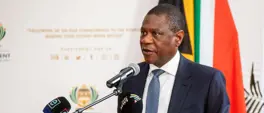POLITRICKING | ‘Why should I regret it?’ Dlamini Zuma talks Phala Phala and GBV
Tshidi Madia
16 August 2023 | 10:50In this week's Eyewitness News podcast, 'Politricking with Tshidi Madia', we speak to Minister in the Presidency for Women, Youth and Persons with Disabilities, Nkosazana Dlamini Zuma, on her calling for an independent report on the Phala Phala saga, and a lack of budget to adequately deal with the GBV scourge.
“I am not serving him, he has appointed me to serve the people, that is what I am doing,” says Dr Nkosazana Dlamini Zuma when quizzed over her decision to continue under President Cyril Ramaphosa’a Cabinet when she’s made it explicitly clear that she has no faith in him as a leader over the past year.
Dlamini Zuma is this week’s guest on _Politricking with Tshidi Madia_, a politics podcast by Eyewitness News.
This week’s conversation, which forms part of a series exploring and celebrating women across multiple sectors, focuses on her long-standing career in politics, and her work as the minister in the Presidency for Women, Youth and Persons with Disabilities.
Dlamini Zuma also shares her thoughts on several issues, including her bid to become the country’s first woman president, concerns about the state of municipalities, former President Jacob Zuma receiving a special remittance of sentence, and the African National Congress's (ANC) prospects ahead of the 2024 general elections.
“Why should I regret it? It was my decision,” she says of being one of the handful of ANC members of Parliament to stand in agreement with opposition calling for the adoption of an independent report by a three-member panel recommending that a case of impeachment could be made against Ramaphosa over his conduct in relation to a burglary at his Phala Phala farm in Limpopo.
The ANC had said it was taking action against Dlamini Zuma, but she remains firm in her decision.
“Well, if you take a decision and you believe that you are right, and your conscience is clear, you will take whatever comes with it,” said Dlamini Zuma.
She also rejected the notion that her appointment to the department she’s currently in charge of is a demotion.
“I don’t know what a demotion is in government. When I get to a department, as long as it's not created for me, it means somebody must occupy it - it wasn’t created for me. It's there, somebody must do it, at this point in time it’s me… maybe they say that because it has no budget,” says Dlamini Zuma.
Her department is often accused of not being visible enough, only finding its way into public discourse around August when South Africa celebrates the defiant spirit of the generation of 1956, when women took to the Union Buildings in protest against the apartheid government and its pass laws.
This, though, is a department that is responsible for the vulnerable in South Africa; it must cater to the youth currently languishing from unemployment, women who are under siege due to gender-based violence (GBV), and persons with disabilities, who to some degree are not being absorbed nearly fast enough into key positions across multiple spheres of the economy.
In this regard, Dlamini Zuma is seemingly frustrated, with not only being told hers is an advocacy department, but it also receives around R1 billion to do its work annually.
“We are a post office, take 700-plus to the NYDA [National Youth Development Agency], take 90-plus to the Gender Commission, and remain with about 200, to compensate employe
Get the whole picture 💡
Take a look at the topic timeline for all related articles.
Trending News
More in Local

28 December 2025 14:20
ANC in the Western Cape takes decision to re-route Cape Minstrel Parade to court

28 December 2025 13:30
National Sea Rescue Institute concerned over rise in drowning and distress incidents involving children

28 December 2025 12:40
Tensions flare as Joburg Human Settlements MMC visits informal settlement in Bryanston










